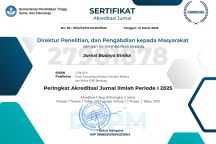KEBERTAHANAN MUSIK ORKES MINANG KINI: KAJIAN ANTROPOLOGI MUSIK PADA MUSIK ORKES TAMAN BUNGA
DOI:
https://doi.org/10.26742/jbe.v7i2.2874Abstract
References
Allen, Robert. 2004. “Populer Music”. Pocket Fowler’s Modern English Usage
Barendregt, Bart. 2002. The sound of ‘longing for home’. Redefining a sense of community through Minang popular music. bijdragen tot de taal-, landen volkenkunde / journal of the humanities and social sciences of southeast asia.
Bastomi, Suwaji. 1992. “Apresiasi Kesenian Tradisional”. Semarang: IKIP Semarang Press.
Beny Pramudyanto, Alexander. 2013, “Media Baru dan Peluang Counter-Hegemony atas Dominasi Logika Industri Musik ; Studi Kasus Perkembangan Netlabel di Indonesia” Universitas Indonesia
Bernet, Tony.1982.”Popular Culture: Defining Our Terms”, dalam Popular Culture: Themes and Issues I, Milton Keynes: Open University Press
Bourdieu, Pierre.1984.“Distintion: A Social Critique of the Judgment of Taste”, terjemahan Banoe, Pono. 2003. Kamus Musik. Yogyakarta: Kanisius.
Colombijn, Freek.2006. “Paco-Paco (Kota) Padang. Sejarah Sebuah Kota di Indonesia Abad ke 20 dan Pengguna Ruang Kota”. Jakarta Ombak. Jakarta
Creswell, John W.2016. Research Design : Pendekatan Kualitatif, Kuantitatif dan Mixed. Penerbit: Pustaka Pelajar.Yogyakarta
Chang, Heewon, 2008. Autoethnografy As Method. California: left Coast pres, Inc
Ediwar, dkk, 2017. “Musik Tradisonal Minangkabau”Gre Publishing, Yogyakarta
Ellis, Carolyn, 2004. “The Ethnografic I A Methodological Novel About Authoethnografhy”. United States of Amerika: AltaMira Pres
Emerson, Robert M., R.I.Fretz & L.L.Shaw. 1995. Writing Ethnography Fieldnotes, The University of Chicago Press,Chicago
Firman. Agusli Taher, 2018.“Perubahan Kebudayaan Dan Perkembangan Musik Pop Minangkabau Di Indonesia”. Fak. Ilmu Pendidikan Univ. Negeri Padang.
Goldsworthy, David J. 1979. Melayu Music of North Sumatra: Continuities and Changes. Sydney: Monash University: Disertasi Doktoral
Gramsci, Antonio. 1999. “Negara dan Hegemoni”. Patria dkk (penerjemah). Penerbit: Pustaka Pelajar, Semarang
Gramsci, Antonio.1971.“Selections from Prison Notebooks”, disunting dan diterjemahkan oleh Quintin Hoare dan Geoffrey Nowell-Smith, London: Lawrence & Wishart
Harjana, Suka, 2003, Corat-Coret Musik Kontemporer Dulu dan Kini. Jakarta: Ford Foundation dan Masyarakat Seni Pertunjukan Indonesia
Iktia, Garcia 2017. Pengantar Teori Musik, Jurnal Ilmiah: Pro Film
Kunst, Jaap, 1955. Ethno-Musicology : A Study of Its Nature, Its Problems, Methods and Representative Personalities to Which is Added a Bibliography”.The Hague Martinus NIJHOFF, Amsterdam.
Koentjaraningrat, 1977.“Metode Wawancara, Dalam Metode-Metode Penelitian Masyarakat”, Penerbit: PT. Gramedia.Jakarta
Koentjaraningrat, 2005, Pengantar Ilmu Antropologi. Penerbit : Rineka Cipta.Jakarta
Myers, Hellen. 1993. “Ethnomusicology: Historical and Regional”.Studies. W.W.Norton, University of California.
Merriam, Allan P. 1964. The Anthropology of Music. Northwestern University Press
Matthew B.Miles, dan Huberman. 1992. Analisis Data Kualitatif,
Nettl, Bruno.2010. Nettl’s Elephant : On the History of Ethnomusicology. University of Illinois, United States of America
Post, C Jennifer. 2005. “Ethnomusicology : A Research and Information Guide”. Rouledge New York and London
Richard Nice, Cambridge,MA.2003. Harvard University Press Collins English Dictionary-Complete and Unabridged 6th Edition
Saptono. 2017. “Teori Hegemoni Sebuah Teori Kebudayaan Kontemporer”. Institut Seni Indonesia Denpasar. Bali
Syafiq, Muhammad, 2003. Ensiklopedi Musik Klasik, Penerbit: Adi Cita, Yogyakarta
Seabrook, John. 2009. "The Price of the Ticket". The New Yorker. Annals of Entertainment
Silaen,HT, 1995. “Pergeseran Fungsi Musik Di Tengah Kehidupan Masyarakat”, Jurnal Ilmiah Pendidikan: Cakrawala Pendidikan Edisi ke 3, Th.XIX
Vredenbregt, Jacob. 1978. Metode dan Teknik Penelitian Masyarakat, Penerbit: PT Gramedia, Jakarta
Yori, Dean Stales. Zusmelia. Zulfa. 2014. Orkes Gumarang: Pelopor Musik Minang Modern Tahun 1953-1980. Padang
Jacobus, Ranjabar, 2006: Sistem Sosial Budaya Indonesia; Suatu Pengantar. Bogor : Ghalia Indonesia.
Downloads
Published
How to Cite
Issue
Section
Citation Check
License
You are free to:
- Share — copy and redistribute the material in any medium or format for any purpose, even commercially.
- Adapt — remix, transform, and build upon the material for any purpose, even commercially.
- The licensor cannot revoke these freedoms as long as you follow the license terms.
Under the following terms:
- Attribution — You must give appropriate credit , provide a link to the license, and indicate if changes were made . You may do so in any reasonable manner, but not in any way that suggests the licensor endorses you or your use.
- No additional restrictions — You may not apply legal terms or technological measures that legally restrict others from doing anything the license permits.
Notices:
You do not have to comply with the license for elements of the material in the public domain or where your use is permitted by an applicable exception or limitation .
No warranties are given. The license may not give you all of the permissions necessary for your intended use. For example, other rights such as publicity, privacy, or moral rights may limit how you use the material.



2.png)
1.png)








